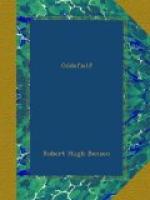“Oh! Dolly,” I cried. “Why are you so bitter with me? You know that I have never thought ill of you for an instant. You know I have done nothing but try to serve you—I have bullied you? Yes: I have; and I would do the same a thousand times again in the same cause. You are wilful and obstinate; but I thank God I am more wilful and obstinate than you. I am sick of this fencing and diplomacy and irony. You know what I am—I am not at all the fine gentleman that leaned his head on the chimney-breast—that was make-believe and foolishness. I am a bully and a brute—you have told me so—”
“Oh!” wailed Dolly suddenly—no longer pretending; and I caught the note in her voice for which I had been waiting. I dropped the lantern; the horses plunged violently at the flare and the crash; but I cared nothing for that. I dragged furiously on the bridle; and as the horses swung together, I caught her round the shoulders, and kissed her fiercely on the cheek. She clung to me, weeping.
CHAPTER V
Well; I had beaten her at last; and in the only way in which she would yield. Weakness was of no use with her, nor gentleness, nor even that lofty patronage which, poor fool! I had shewn her in the parlour at Hare Street. She must be man’s mate—which is certainly a rather savage relation at bottom—not merely his pretty and grateful wife. This I learned from her, as we rode onwards and up into the high road—(where, I may say in passing, there was no sign of our party)—though she did not know she was telling it me.
“Oh! Roger,” she said. “And I thought you were a—a pussy-cat.”
“That is the second time I have been told so in two days,” I said.
“Who told you so?”
“His Majesty.”
“I thought His Majesty was wiser,” said she.
“He has been pretty wise, though,” I said. “If it were not for him, we should not be riding here together.”
“I suppose you made him do that too,” she said.
* * * * *
But it was not only of Dolly that I had learned my lessons; it was of myself also. I was astonished how inevitable it appeared to me now that we should be riding together on such terms; and I understood that never, for one instant, all through this miserable year away from her, had I ever, interiorly, loosed my hold upon her. Beneath all my resolutions and wilful distractions the intention had persevered. All the while I was saying to myself in my own mind that I should never see Dolly again, something that was not my mind—(I suppose my heart)—was telling me the precise opposite. Well; the heart had been right, after all.
* * * * *
She asked me presently what I should say to her father.
“I shall forgive him a great deal now, that I thought I never should,” I said with wonderful magnanimity. “A few sharp words only, and no more. You see, my dear, it was through his sending you to Court—”




